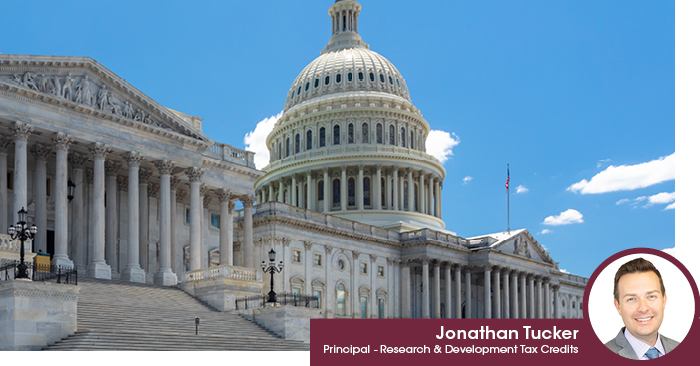Follow KBKG on Social Media
By Jonathan Tucker | Principal, Research & Development Tax Credits
The Senate Finance Committee has proposed a significant change to the way U.S. businesses deduct their research and development (R&D) expenses. If passed, the bill would reverse a major change that took effect in 2022 based on the Tax Cuts and Jobs Act (TCJA) of 2017, and allow businesses to once again deduct R&D costs in full for at least domestic activities, in the year they are incurred.
Full Deduction Returns for U.S. R&D
Under the current rules (in effect since 2022), companies must amortize their R&D expenses over five years if the work is done in the U.S., and 15 years if done outside the U.S. This requirement was part of the TCJA and has created cash flow challenges for many businesses, especially those investing heavily in innovation.
The Senate’s new proposal would restore immediate expensing permanently for R&D activities performed in the United States. This would apply to costs incurred in tax years beginning after December 31, 2024. The change is written into a new section of the tax code, Section 174A, dedicated solely to domestic research and experimental expenditures.
Foreign R&D Still Amortized
The proposed change would not affect the treatment of foreign R&D expenditures. These costs would continue to be amortized over 15 years. This creates a clear distinction in how domestic and foreign research expenses are handled.
Optional Amortization for Domestic R&D
While full expensing would become the default, the bill would allow businesses to elect to amortize domestic R&D expenses over a period of at least 60 months, beginning when the benefits of the research are realized. This election must be made by the due date (including extensions) of the tax return for the year in which the expenses are incurred.
Small Business Relief for 2022-24
One of the most impactful provisions is a special rule for small businesses. Companies that meet the gross receipts test under Section 448(c), generally $31 million or less, would be allowed to apply the new expensing rule retroactively, all the way back to the 2022 tax year.
To do this, the business must make an election within one year of the bill’s enactment and file amended tax returns for the applicable years. This would allow the company to reclaim taxes already paid on previously amortized R&D expenses. All other taxpayers that incurred domestic research or experimental expenditures after December 31, 2021, and before January 1, 2025, are provided the option to deduct any remaining unamortized R&D from 2022–24 in full in the first tax year after 2024 or spread it evenly over two years.
Accounting and Administrative Relief
Businesses making these elections would be treated as changing their method of accounting. The change would be considered automatically approved by the IRS and would not require a formal request. For returns already filed, this approach simplifies the process and avoids IRS penalties.
The bill also includes guidance to ensure proper coordination with the research credit under Section 41, Section 280C(c), and accounting method rules under Section 481, ensuring businesses can manage the transition without undue complexity.
Conclusion
Although this bill is not yet law, companies, especially small and mid-sized businesses with R&D operations, should begin reviewing their 2022–24 tax returns and identifying domestic R&D costs. Those that may qualify as small businesses should prepare to take advantage of the retroactive relief if the bill passes.
If enacted, this proposal would significantly ease the tax burden for innovation-focused companies and improve short-term cash flow, making it easier to reinvest in product development and technology.
How KBKG Can Help
KBKG will continue to monitor the legislative process and advise clients if the bill becomes law. For questions about how this may impact your company or how to prepare amended returns, contact a KBKG expert today.
About the Author
Jonathan Tucker | Principal – Research & Development Tax Credits
Jonathan Tucker is based in Atlanta, GA, and has over 20 years of experience providing federal business tax advisory services, primarily in R&D tax credits, to clients in various industries including technology, manufacturing, transportation, healthcare, retail and consumer products, hospitality, media and entertainment, financial, and other professional services industries. Read More



